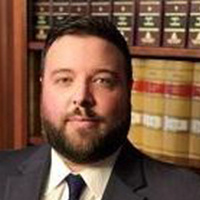 Burlington Criminal Lawyers, Connecticut
Burlington Criminal Lawyers, Connecticut
Sponsored Law Firm
-
 x
x

Click For More Info:
-
Attorney John F. O'Brien
411 Center Street Manchester, CT 06040» view mapCriminal Defense Law Affordable Criminal Defense
Attorney John F. O'Brien is an experienced criminal defense lawyer and trial lawyer. You don’t have to go through this alone, we are here to protect you and your rights!
60-290-9090
Sponsored Lawyers
1-10 of 13 matches
Divorce & Family Law, Criminal, Personal Injury, Wills & Probate, Real Estate
Attorney Levy earned his B.A. from the State University of New York at Buffalo, and his J.D. from Antioch School of Law. He was admitted to the Connecticut Bar in 1984 and the U.S. District Court, District of Connecticut in 1985. Attorney Levy is a member of the Litchfield County Bar Association, Connecticut Bar Association, the American Bar Association (Family Law Section) and the American Association for Justice. An author of articles on various aspects of family law, Attorney Levy's work has been published in the Connecticut Family Law Journal and the American Bar Association's Family Advocate. Attorney Levy has participated as a Special Master in the Litchfield, Waterbury and Hartford Judicial Districts as well as the Regional Family Trial Docket in Middletown, Connecticut. Attorney Levy has been responsible for the operation of the Special Masters Pretrial Program in the Litchfield Judicial District since 2005. Attorney Levy has been in private practice since 1984, and his areas of practice include Family Law, Civil Litigation, Residential Real Estate Transactions, Personal Injury and Probate Matters.
(more)Criminal, Workers' Compensation, Personal Injury, Divorce & Family Law, Wills & Probate
Robert A. Salerno attended Law School and received a B.S. from High Point University in 2005 and his Juris Doctor in 2009 from Touro Law Center. He was admitted to the Connecticut Bar in 2009 and was a Temporary Assistant Clerk working closely with judges in the Waterbury Judicial District for two and a half years before joining The Law Offices of Conti & Levy. He is a member of the American Bar Association, Connecticut Bar Association; Criminal Law and Young Lawyers Section. He is also the Court Liaison for the Connecticut Criminal Defense League Association for Litchfield County as well as Co-Chair of the Criminal Law Society for the Litchfield County Bar Association. Attorney Salerno was active in the Student Bar Association during his studies at Touro Law Center and received multiple awards, including Exemplary Contributions to the Quality of Student life, Exceptional Contribution to the Growth of the Law Center, and Exceptional Service to the Public and Community. He was also a founding member of the Criminal Law Society and the Student Bar Association's Vice President in his last year of school.
(more)Accident & Injury, Criminal, Estate, Business, Workers' Compensation
Nicholas T. Kocian is the president and founder of the Kocian Law Group. Nick has practiced law for over thirty years focusing on personal injury matters, including but not limited to medical malpractice, motor vehicle, products liability, construction, premises liability and workers’ compensation claims. He has handled cases at all stages of litigation and trial, including civil jury trials, court/bench trials, formal hearings before the Workers’ Compensation Commission, and hearings at the CRB appellate level. Nick has also appeared before the Connecticut Supreme Court. Prior to establishing the Kocian Law Group, Nick was associated with a prominent New York Wall Street firm where he defended physicians and hospitals in medical malpractice claims throughout New York. In this position, Nick worked with leading trial lawyers, becoming skilled in litigating and preparing cases and gaining an extensive understanding of how insurance carriers defend medical malpractice claims. Nick initially opened his own solo attorney practice in Hartford, Connecticut. His firm was founded on the principle of providing professional, immediate and personalized legal representation to individuals who have been injured or harmed by the negligence of others. Nick’s philosophy is that the needs of the client come first and being a lawyer means always standing up for the rights of your clients, regarding significant events and issues that affect their lives, and fighting for truth and justice. Today, the Kocian Law Group has evolved into a multi-specialty practice committed to protecting the rights of individuals and families with attorneys working across four office locations in Connecticut and one office in New York.
(more)


 John F. O'Brien Manchester, CT
John F. O'Brien Manchester, CT Practice AreasExpertise
Practice AreasExpertise



